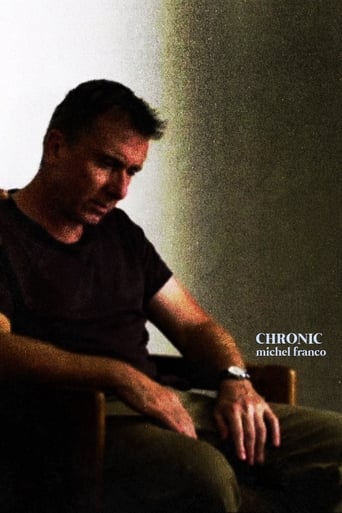

As a person who suffers from chronic pain, it brought to me a sense of compassion for David as he is clearly dedicated to his patients and that was very touching. I felt that the movie moved brilliantly as it mirrored the lives of people who are sick, struggling and suffering. When you are ill with a sickness for long periods of time, life does move slowly for you. Days are much longer, harder to deal with as the hours tick by while you struggle for relief or an offering of help/compassion. You can also see that behind Davids eyes, he carries much grief and possibly guilt for his son, as you discover through the conversations that he shares throughout the movie. It is almost as if he is trying to redeem himself for his choices in the past, good or bad, that he seeks redemption. As for the ending, I was shocked as to how it played out. At first I thought it was by accident, but then I thought of Davids pain and guilt. I felt as if he could never truly forgive himself, given the prior conversations he had with others, and he felt that he could no longer live with that pain. I have always enjoyed Tim Roth and found his portrayal of David spot on.
... View MoreWhile Mexican director Michel Franco's story about a palliative care worker may not be completely developed, his overarching theme proves to be quite illuminating as well as disturbing. His protagonist is the driven David, very well-played by Tim Roth, known for work in wide variety of independent and mainstream features.Chronic is divided into three segments focusing on the three patients David cares for. The first has little dialogue and focuses on David taking care of an emaciated woman whom we later learn is named Sarah. The camera is fixed at a distance and we see David assiduously attending to Sarah, carrying her around as she is unable to walk and propping her up in the shower, as he bathes her. Soon afterward David is attending the woman's funeral and is approached by the niece of the woman who seeks information as to her aunt's last days. David declines to speak with her. Franco's theme soon becomes apparent—family members keep their distance from relatives chronically ill, facing their last days. Only the palliative care worker—in this case one who appears to care deeply about his patients—seeks to get involved by engaging with the dying, on a deeper emotional level.David so identifies with his patients that when queried by strangers at a bar, he refers to Sarah as his wife, an AIDS patient, who has just died. In the next and most compelling segment, David goes as far as going to a bookstore and purchasing books on architecture in order to converse with his next charge, John, a former architect now debilitated by a devastating stroke. Again, it's the extra effort he puts in to take care of his patients that's so impressive (he voluntarily takes over the night shift for the next nurse on duty free of charge). Unfortunately, John's family doesn't take too kindly to David allowing John to watch pornography on his laptop, and soon he's being accused of sexual harassment and forced to leave John immediately. Again the theme of society's aversion to confronting mortality is reiterated. There is nothing salacious about David's actions—he simply seeks to improve the quality of life for his patients and bring them a measure of humanity and dignity in their dying days.What causes David to be so self-sacrificing? Franco presents David's backstory in dribs and drabs—contact via the computer and in person between his ex-wife and daughter provides a sketchy picture of a man who was forced to deal with the terminal illness of his son—ultimately deciding to pull the plug much to the chagrin of family members. There's not much more to what makes David tick but he's the kind of saint that makes people uncomfortable. Franco's portrait of David's devotion to his patients is uplifting and reminds us that we should all be more sympathetic to those facing end of life issues.In the last segment, David forms a relationship with a woman undergoing chemotherapy and ultimately facing a terminal diagnosis. Again David's engagement of the dying is cathartic, but Franco now shifts gears by injecting another issue into the narrative involving assisted suicide. David's ambivalence about how he handles this situation is brought out and this is how the story basically ends.There is a coda, however, that some critics found specious (Super Spoilers ahead). David, who jogs in his spare time, is suddenly hit by a car and is killed in the final scene. Franco perhaps is hammering us a bit too hard when the devoted healer ironically meets an untimely end himself.Chronic is not for everyone. It's slow-moving and its protagonist is not much of a developed character. Nonetheless, the theme of compassion for the dying and society's aversion to such a subject, is a wake-up call for the majority of us who choose not to reckon with the reality of our own mortality.
... View MoreI went to see this movie because of the Cannes Film Festival best screenplay award that the film had won. It was indeed a good film, with good acting by Tim Roth.The screenplay is good but it has liberally borrowed ideas, without acknowledging it, from Uberto Pasolini's 2013 film,"Still Life," a winner at theVenice film festival. All the director/screenplay writerhas done is that he transformed a bachelor bureaucrat to a divorced male nurse and passed it off as "original" writing. And to think this plagiarism leads to a Cannes top award! Shame on the director! It also brings down the prestige of Cannes' awards. Recently another Cannes Jury conferred the Golden Palm to Haneke's "Amour,"which in turn had copied chunks of sequences/ideas from Runnarson's 2011 Icelandic film "Volcano."Obviously, the Cannes jury had never seen "Still Life." The jury could instead have conferred the best actor award to Tim Roth-who would have deserved it. It underscores the lack of knowledge of current cinema by juries at Cannes in recent years.For those who have not viewed either, please view "Still Life" first.
... View MoreOne warning first. Don't go to see this movie if you are not in the mood to.Don't go to see this movie if one of your friends or relatives is suffering of a lethal disease such as cancer, AIDS or what so ever...Don't go to watch this movie if you are depressed or just to commit suicide.But, yes, yes, yes it's a wonderful, moving story here showing the daily burden of a male home nurse taking care of terminal cancer phase or severe brain vascular damages patients. Some very hard watching scenes but nothing gratuitous here, on the contrary, so close to reality. Tim Roth is terrific in this feature, in this ambivalent, disturbing but so kind man in the same time. A so gripping character. I love the film making, with so many still camera shots all the time, in the pure European or non Hollywood films style. And the story is very like another movie from UK I watched this year: STILL LIFE. With a very similar character and a very same ending. A real must see but not for all audiences.
... View More